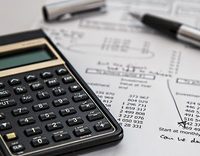What is a mortgage and how does it work?
 A mortgage is a loan that can be taken out to purchase a property. The property is used as security in the event of non-payment of the loan. With a mortgage you can borrow up to between 90%-95% of the purchase price of a property with a typical repayment period of 25 years.
A mortgage is a loan that can be taken out to purchase a property. The property is used as security in the event of non-payment of the loan. With a mortgage you can borrow up to between 90%-95% of the purchase price of a property with a typical repayment period of 25 years.
The amount you borrow on a mortgage, as a percentage of the purchase price, is known as the Loan to Value (LTV) and the lower the LTV the larger the number of mortgage deals available.
How much can I borrow on a mortgage?
Most lenders will lend up times 4.5 times your annual income or 4.5 times both incomes if you are buying with a partner. Your income together with your employment status (employed or self-employed) are the main factors in deciding how much a lender is prepared to lend on a mortgage but other factors such as monthly expenditure and your credit history also play a large part.
All lenders will carry out a full income & expenditure analysis together with viewing your credit report before deciding how much they are prepared to lend you.
To calculate how much you can borrow on a mortgage as well as the monthly cost, visit our Mortgage Best Buy Table where you can find the best mortgage for your circumstances. For those looking for a mortgage of over £500,000, check out our article 'How much do I need to earn for a £500k mortgage?'.
How do I repay a mortgage?
There are two repayment methods available when you take out a mortgage:
Repayment mortgage
Where every monthly payment includes both capital and interest, reducing the amount outstanding on the mortgage over time. The mortgage will be repaid in full by the end of the term.
Interest-only mortgage
Where every month just the calculated interest owed for that month is paid with no reduction in the capital. At the end of the mortgage term the capital must be repaid in full.
The vast majority of mortgages are set up as a repayment mortgage, also referred to as a capital & interest mortgage. To arrange an interest-only mortgage the lender will normally need proof regarding how the loan will be repaid at the end of the term.
How much deposit do I need to obtain a mortgage?
The minimum deposit required by most lenders is 10% of the property purchase price although the larger deposit you have the larger the number of mortgage deals available to you.
You must be able to prove to a lender the source of your deposit at the time you make an offer to purchase a property. Some lenders will allow a gifted deposit from a parent but may limit this to a percentage of the total deposit. If the deposit has been gifted then the applicant may have to prove that the gift does not have to be repaid.
Mortgage types
There are a number of different types of mortgage deals available:
Fixed
The interest rate charged is fixed for a number of years, typically 2, 3 or 5 years. After the fixed-rate deal expires the interest rate charged will be the Standard Variable Rate (SVR) charged by the lender at the time
Tracker
The interest rate charged tracks a selected interest rate such as the Bank of England base rate and changes in line with the changes to the tracked interest rate
Discount
The interest rate charged is discounted for a period of time, typically 1 or 2 years. After the initial period, the interest rate will revert to the lender's SVR
Variable
The interest rate is charged at the lender's SVR and will change every time the lender changes its SVR. This will mean that your monthly mortgage payments will vary over time
Capped
The interest rate charged is variable but the rate is capped. This provides a ceiling above which the interest rate cannot rise, however, it is usually for an introductory period only.
Offset
The interest is normally variable and the mortgage is linked to a savings or investment account. The balance on your savings or investment account reduces the outstanding balance on the mortgage and subsequently reduces the monthly mortgage repayments.
Most banks and building societies offer a variety of mortgages deals and you can apply directly with a lender or use the services of a qualified mortgage broker to source the best deal for your circumstances.
How much does a mortgage cost?
In addition to affording the monthly mortgage payments, there are other mortgage fees and costs involved in arranging a mortgage, such as:
Arrangement fee
This is a fee for the mortgage product you have chosen and varies between products and lenders and can be as much as £2,000 depending on the product you choose. You may be able to add this fee to the loan but this will increase the amount you owe and the interest you end up paying.
You should check these fees before committing to the mortgage as some mortgage products have a low headline interest rate but a high arrangement fee that may disguise the true overall cost. I suggest you use our Mortgage Best Buy Table as you can source a mortgage to suit your needs and sort the mortgage products by 'Monthly repayment', 'Lender fees' or 'Total cost'. Selecting 'Total cost' allows you to see the overall effect of the lender fees.
Booking fee
This fee may be charged just to secure the mortgage if there are limited funds available for a certain product. This fee is paid at the time of application and is normally non-refundable if the mortgage application is aborted for any reason. This fee may form part of the arrangement fee and will usually be around £200-£300.
Mortgage admin fee
Some lenders may charge an administration fee to open a new mortgage account and this could be in the region of £100-£300.
Survey
A lender will require a survey to be carried out on the property to confirm that the price being paid reflects the true value of the property. A HomeBuyer report is the normal survey requested by a lender and this will only highlight issues that may affect the value of the property if not resolved,. The fee for this type of survey is typically £400-£500 and varies depending on the value of the property. If you are purchasing a property that needs upgrading or requires repairs then it may be worth having a more detailed survey carried out. A full structural survey could cost £1,000 or more. A full structural survey will give you peace of mind as you will be able to fully understand the condition of the property you are buying, however, you may have to pay for this survey in addition to a Homebuyer Report required by the lender.
Mortgage broker fee
If you use the services of a mortgage broker then they may charge a fee for their services which could be as much as £500. Habito* is an online mortgage broker that does not charge a fee for its service.
Solicitor costs
To purchase a property you'll need to use the services of a solicitor or conveyancer to complete the legal work required. The cost for this, including local searches, could be between £1,000 & £1,500.
Stamp Duty
Stamp duty is the land tax owed on a property once the purchase is complete. Stamp duty is payable on property purchases over £250,000 or £425,000 if you are a first time buyer. For a full breakdown of stamp duty and how it works, read our article 'Everything you need to know about stamp duty'.
How to apply for a mortgage
Using a mortgage broker
Engaging the services of a mortgage broker will provide you access to a larger range of lenders and options but they may charge a fee for their services. Some of the mortgage deals available to mortgage brokers may not be available to the public but make sure you check the broker's terms & conditions so you are aware of any costs involved for arranging a mortgage. The UK mortgage market is very competitive and we have teamed up with Habito, an online mortgage broker who we are confident will provide the best service to source your mortgage. For more information on Habito read our review - Habito Review: The best online mortgage broker for you?
Apply directly with the lender
Applying directly with a lender is an option but you will be limited to the range of mortgage products provided by the lender. If, however, your application is unusual or you need them to stretch their criteria regarding income multiples then a lender that you have a strong relationship with might be an option worth pursuing.
Consider obtaining a mortgage in principle
Whether you are using a mortgage broker or applying directly with a lender it may be worth obtaining a mortgage in principle. A mortgage in principle is where a lender takes some information from you regarding occupation, income and mortgage required then will confirm the amount they will lend on a mortgage providing the survey and final credit checks are all approved.
Things to do before applying for a mortgage
Prepare a budget
Before applying for a mortgage you should carry out a full review of your finances so you fully understand your income and expenditure and know how much you can afford to pay each month in mortgage repayments.
We have written a comprehensive article on the subject of budgeting that you should find helpful - Start ‘big picture’ budgeting. Alternatively, you may want to check out our article 'The best budgeting apps in the UK: How to budget without trying'
Check your credit report
One of the things a lender will check when you apply for a mortgage is your credit report. Your credit report is a record of all your credit transactions including any missed payments or defaults. It is vital that you check your credit report to avoid any problems when you are ready to apply for a mortgage. It is well worth reading our article - Check your credit report to understand more.
Prepare paperwork
There are a number of documents a lender will need to see before approving your mortgage such as:
- proof of name and address
- proof of income - last 3 months' payslips or SA302 if you have income from more than one source or are self-employed
- self-employed people should look to provide information alongside their tax return, which supports what the SA302 says about their income, such as bank statements
- bank statements for the last three to six months
- proof of deposit - the lender will want proof of deposit (bank statement) when you make a mortgage application
- utility bills
- proof of benefits received
- passport or driving license
Further reading
We have written the following articles that are well worth reading if you are thinking of buying a property:
How to get the best mortgage deal
7 ways to increase your chances of getting a mortgage
8 things you should know before applying for a mortgage
If a link has an * beside it this means that it is an affiliated link. If you go via the link Money to the Masses may receive a small fee which helps keep Money to the Masses free to use. But as you can clearly see this has in no way influenced this independent and balanced review of the product. The following link can be used if you do not wish to help Money to the Masses or take advantage of any exclusive offers - Habito





